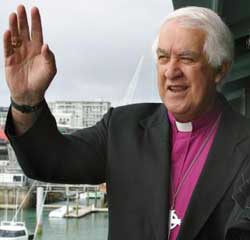 Bishop Sir Paul Reeves died in Auckland Sunday morning, 14 August. He was aged 78.
Bishop Sir Paul Reeves died in Auckland Sunday morning, 14 August. He was aged 78.
The Reeves whanau (family) wish to acknowledge the immense support they have received since Sir Paul announced he was stepping back from most aspects of his public life after the recent diagnosis of cancer.
The immediate whanau will spend some private time with Sir Paul before the public tangi (funeral service) begins tomorrow at the Church of the Holy Sepulchre in Auckland. There will be a state funeral in the latter part of the week. The whanau acknowledge and are very aware of the immense grief and loss felt by Maori, the Church and the wider community, and there will be time and opportunity for people to pay their respects in the days to come.
Born in Wellington, Sir Paul’s whakapapa (genealogy) is Te Atiawa. He began his ministry as a deacon in Tokoroa and later spent five years England. In 1964 as Vicar of Okato, a Taranaki coastal town, Sir Paul lived amongst his whanaunga (kin). He was appointed Bishop of Waiapu in 1971. In 1979 he became Bishop of Auckland, and then Primate and Archbishop of New Zealand the following year. In 1985 Sir Paul was appointed Governor-General, the first Maori to hold that position.
Speaking on behalf of the Anglican Church of Aotearoa, New Zealand and Polynesia, Archbishop David Moxon says, “Bishop Paul took the office of being a bishop and an archbishop into the role of Governor General. He aimed to bring people together, to listen to people at the edges and to speak to issues. In his role he was always present amongst the people. He continued to follow the gospel and remained a bishop contributing a great deal to our church and community. Bishop Paul was and remains a taonga (treasure) to us and future generations.”
Sir Paul was the Anglican Observer at the United Nations from 1991 – 1993. He observed elections in Ghana and South Africa on behalf of the Commonwealth and assisted with the constitutional reform process in Guyana. He chaired a review of the Fijian Constitution. Sir Paul acted as the Commonwealth Special Observer to Guyana and Fiji, and appointed in 2005, was the incumbent Chancellor of Auckland University of Technology.
Sir Paul was a member of the Provincial Commission on Prayer Book Revision from 1968-1971 and again from 1978-1980.
I found the clip moving on TV3 News last night, when Sir Paul in 2007 received NZ’s highest honour, the Order of New Zealand, he summed up his life’s work as, “fundamentally, I’m a priest of the Anglican Church…I’ve helped good people do good things.”
Whakangaro i te ao,
i runga i te aroha o te Atua Matua,
nana nei koe i hanga;
i runga i nga mahi tohu a Ihu Karaiti,
nana nei koe i hoko;
i runga i te mana o te Wairua Tapu,
e whakakaha nei i a koe.
Whakauru atu ki te kahui o te hunga pono;
noho mai i runga i te rangimarie.




I accompanied Sir Paul Reeves on a “fact finding mission” to Great Whale River in Northern Quebec some time in the early nineties. He was a great old guy!
Thanks for the comment. It would be good to have your real name.
I just read the article on him in Wikipedia. What struck me was the motto on his coat of arms: “Whakarongo (Listen)”. I need to remember that more.
Thanks for highlighting that, Matt. “Listen” is also the first word in the Rule of Benedict – a spirituality that I find very contemporary.
I think between that and Bartimaeus’ reply to Jesus, “Master, I want to see,” there’s a pretty good outline of how I want to purpose my life. It sounds like Bishop Reeves did that with his.
Bosco, how is a man who looks to be in the photos that I have seen, as Caucasian as the next white person I know, named Paul Reeves, Maori?
Brother David, just as there is a variety of skin tone and facial features of Caucasians so the same is true here of Maori. Furthermore, there would be no surnames that would preclude being Maori. Maori are normally very conscious and proud of their whakapapa (listing off their ancestry from memory). I cannot quickly find Sir Paul’s whakapapa other than what is in the post above that Sir Paul is part of the Te Atiawa iwi (iwi might be translated as “tribe” to keep the concept simple). Blessings
Hi Bosco,
Find your web pages illuminative of complex Anglican legislature and recent foment and schismatic rumblings arising from Lambeth 3 years ago, presumably? Aside all that confusing dissent and assent; I too share your column’s high regard for Bishop Paul’s passing. He was able to walk the divide between liberal tolerance and evangelical fervour in the church and provided modules that promoted tolerance and “awhi” between Maori and Pakeha and their ecclesial structures. It seems we still need more of that.
Aside of that he was a statesman of global significance yet could recognise and greet a mere former parishioner by name complete with all personal details and circumstances years later. Snow garments clothed Aotearoa/ NZ’s remembrance of his passing.
Kia ora bro
Thanks, Rein. Blessings.